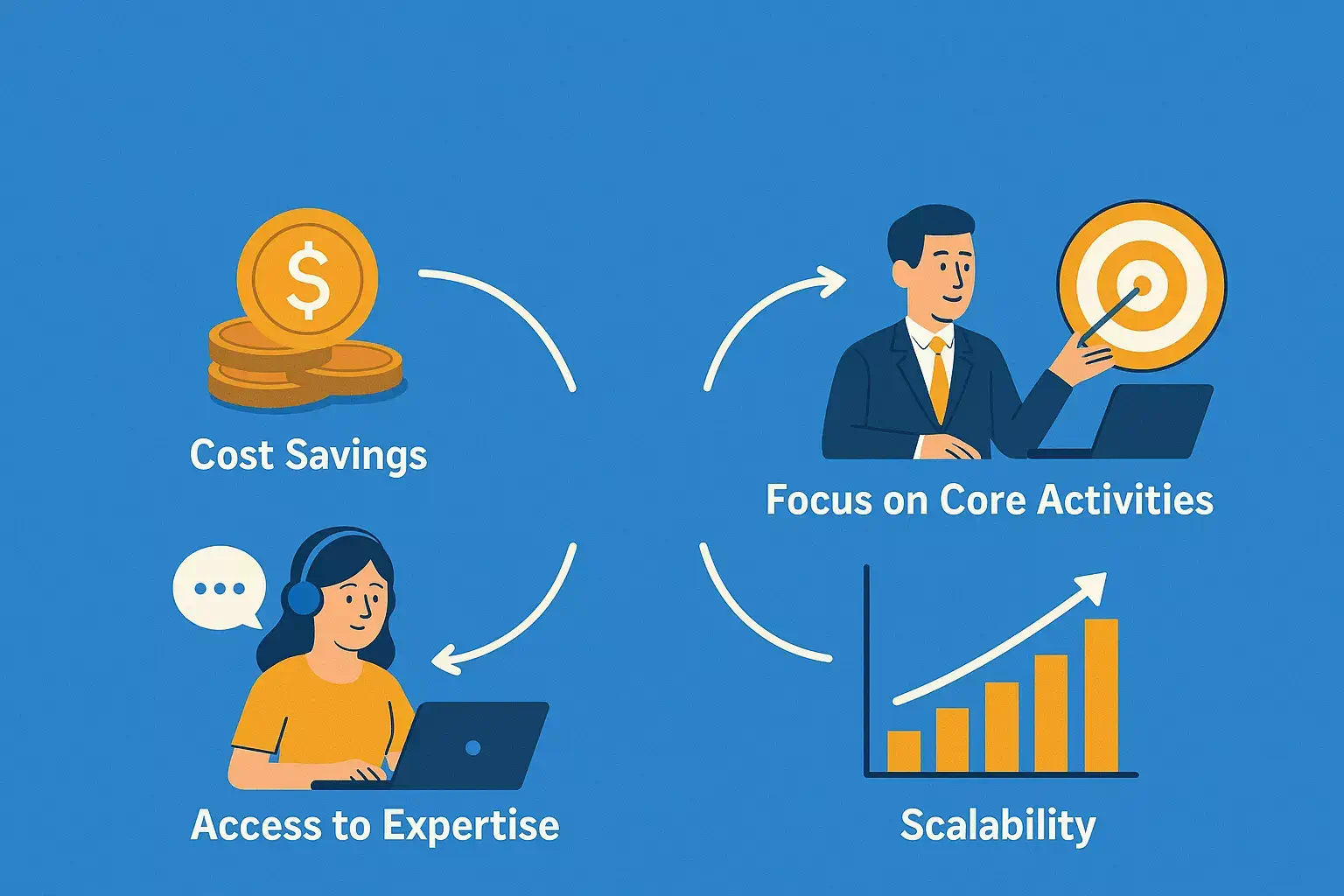Business process outsourcing has long been recognized as a powerful solution for companies aiming to reduce operational costs and improve efficiency. But in the last two decades, the industry has gone through a dramatic transformation. What once began as a purely transactional and cost-driven approach has evolved into a dynamic, tech-enabled partnership model that supports growth, scalability, and digital transformation.
This evolution marks a shift in how outsourcing is perceived. BPO in the digital era is not merely a back-office extension. It is a core part of strategic operations, innovation, and agility. As we examine BPO then and now, the contrast reveals how far the industry has come and why it remains essential in today’s digitally connected world.
BPO Then – The Age of Cost-Cutting and Transactional Support
In its earliest form, business process outsourcing was born out of necessity. Faced with rising labor costs, companies in North America and Europe began outsourcing repetitive, non-core tasks to countries like India and the Philippines. The most commonly outsourced services included data entry, payroll processing, call center operations, and basic IT support.
The primary motivation at the time was financial. By relocating these tasks to lower-cost regions, businesses could reduce overhead and reallocate resources toward their core offerings. This model worked, and the BPO industry grew rapidly during the 1990s and early 2000s.
However, the traditional model came with limitations. Communication was often rigid, processes were highly manual, and outsourcing relationships were viewed more like vendor-client transactions rather than strategic partnerships. Innovation was minimal, and the services offered remained within a narrow operational scope.
BPO Now – From Support Function to Strategic Enabler
Today, BPO is no longer limited to cost-cutting. The digital era has expanded both the scope and the value of outsourcing. Rather than simply taking tasks off a company’s plate, modern BPO providers deliver high-impact, technology-driven services that help businesses scale and compete.
Some of the most significant changes include:
- Technology Integration: BPO providers now offer automation, artificial intelligence, data analytics, and cloud-based services. These tools improve accuracy, speed, and decision-making capabilities.
- Process Innovation: Instead of sticking to client-set routines, modern BPO firms proactively improve workflows using process mapping, digital platforms, and continuous optimization.
- Knowledge-Based Services: Outsourcing is no longer about low-skill labor. It now includes advanced functions such as cybersecurity, content creation, financial analysis, software development, and digital marketing.
- Agile and Remote Delivery: The shift to remote work has allowed outsourcing teams to be more flexible, agile, and responsive. Providers like BPOManila have adopted cloud-based collaboration to deliver services from anywhere in the world.
- Client-Centric Partnerships: The relationship between BPO providers and clients has shifted. It is now based on value creation, KPIs, and long-term strategy rather than just fulfilling a list of tasks.
What Drove the Transformation
Several factors accelerated the transition from traditional BPO to its modern form. The rise of cloud computing made it easier to share data and run processes remotely. Artificial intelligence allowed repetitive tasks to be automated, while advanced analytics turned raw data into actionable insights.
Another key driver was the demand for speed and flexibility. In the digital age, businesses must innovate quickly and adapt to shifting customer expectations. Rigid outsourcing contracts no longer met these needs. Today, companies require BPO partners who can move fast, scale up or down, and contribute to digital roadmaps.
The global health crisis also played a role. During the pandemic, companies that had already embraced digital outsourcing were able to maintain continuity and even grow. Those still relying on outdated systems were forced to modernize their approach.
How BPO Benefits in the Digital Era
Modern BPO thrives not in spite of the digital age but because of it. With the right strategy and technology in place, outsourcing becomes a direct contributor to digital transformation. Here are several ways BPO benefits from this era:
- Enhanced Efficiency: Automation and Ai improve speed, accuracy, and productivity. BPO providers can process more with fewer resources, delivering better value.
- Scalability Without Delay: Businesses can expand into new markets or ramp up operations quickly with flexible outsourcing models.
- Access to Digital Talent: From software engineers to data scientists, BPO now connects clients with highly skilled professionals who are difficult to hire internally.
- 24/7 Operations: With teams spread across time zones, businesses gain around-the-clock service, critical for global operations and customer support.
- Risk Reduction: Many BPO providers specialize in compliance, cybersecurity, and continuity planning, helping companies navigate legal and operational risks.
- Real-Time Analytics: Advanced data platforms allow clients to track progress, measure performance, and make data-driven decisions.
BPOManila and the Rise of Tech-Enabled Hubs
Cities like Manila have played a key role in the transformation of global outsourcing. Known for its strong English-speaking workforce, cultural compatibility, and tech-savvy professionals, the Philippine BPO industry has expanded far beyond voice services.
Companies like BPOManila are at the forefront of delivering digitally mature solutions. From omnichannel customer support to cloud IT services and digital finance operations, these firms offer comprehensive outsourcing experiences designed for modern businesses.
By investing in upskilling, cloud infrastructure, and cybersecurity, BPOManila and similar providers ensure that clients receive not just services, but strategic support tailored to the digital economy.
A Digital Partnership
As we look ahead, BPO will continue evolving in response to emerging technologies and shifting business needs. Here are some trends shaping the future of outsourcing:
- Hyperautomation: Combining Ai, robotic process automation, and machine learning to eliminate manual tasks across departments.
- Industry-Specific Services: Customized outsourcing for healthcare, fintech, eCommerce, and legal sectors will become more common.
- Experience-Centric Delivery: Beyond process completion, BPO will focus on end-user satisfaction, employee experience, and customer engagement.
- Sustainability Goals: Outsourcing firms will help clients meet ESG targets through energy-efficient operations and compliance tracking.
The days of one-size-fits-all outsourcing are over. Businesses now look for agile, responsive, and innovative partners who can navigate the digital future with them.
Ready to Evolve With Us?
BPO today is smarter, faster, and more strategic than ever. If you are ready to move beyond outdated workflows and embrace a future built on digital intelligence, now is the time to explore your outsourcing options.
At BPOManila, we specialize in delivering forward-thinking services designed to support businesses in every stage of digital transformation. Whether you need automation support, IT consulting, or advanced analytics, our team is here to help.
Contact us today to discover how outsourcing in the digital age can power your next chapter.

